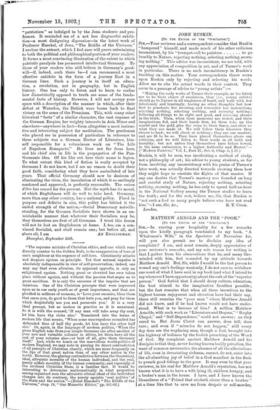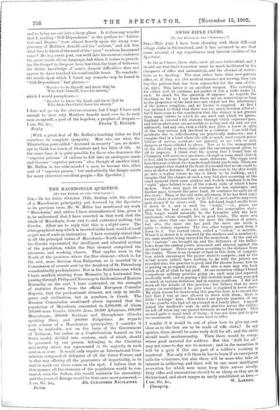MATTHEW ARNOLD AND THE "POOR."
[TO THE EDITOR OP THE "SPECTATOR.')
SIn,—In craving your hospitality for a few remarks upon the kindly paragraph vouchsafed to my book, " A Whaleman's Wife," in the Spectator of November 1st, will you also permit me to disclaim any idea of complaint ? I am, and must remain, deeply appreciative of your• reviewer's remarks, and my sole reason for writing is that I gather from his observations that he, and many like- minded with him, feel wounded by my attitude towards Matthew Arnold. But, Sir, while I would be the last person to wound any one's feelings wantonly, I do not care to withdraw one word of what I have said in my book (and what I intend to say whenever I have opportunity) about the cult of the "superior person." God forbid that I should decry culture, education, the best stimuli to the imaginative faculties possible ; but the fact remains that when all these incentives to the highest human enjoyment and elevation have had their• say, there still remains the "poor man " whom Matthew Arnold did not know, and if he had known would not have under- stood. What is to become of him ? A million Matthew Arnolds, with such work as " Literature and Dogma," " Rugby Chapel," and " Self-Dependence," could not answer; an they cared to. But Jesus Christ can answer, does tell, does care ; and even if " miracles do not happen," still every day does see the wayfaring man, though a fool, brought into the highway of holiness by the foolish preaching of the Word of God. My complaint against Matthew Arnold and his disciples is that they, never having known bodily privation, the want of common necessaries, the absence of all the alleviations of life, even in devastating sickness, cannot, do not, enter into the all-absorbing joy of belief in a God manifest in the flesh to preach good tidings to the poor. It may even be that your reviewer, in his zeal for Matthew Arnold's reputation, has not known what it is to have a wife lying ill, children hungry, and a broker's man in the house. I have, and I have known the blessedness of a "Friend that sticketh closer than a brother" at a time like that to save me from despair or self-murder,
and to bring me out into a large place. Is it then any wonder that I, reading "Self-Dependence" or the preface to "Litera- ture and Dogma," turn almost fiercely upon the smug com- placency of Matthew Arnold and his "culture," and ask him what does he know of the need of the " poor " to whom Immanuel
came ? He is a sweet poet, can weld into harmonious cadences the great words of our language, but when it comes to preach- ing the Gospel to the poor, he is less than the least of believers, the divine knowledge of man's deepest difficulties does not appear to have touched his comfortable heart. To conclude : the words upon which I based my remarks may be found in " Self-Dependence," last phrase,— "Resolve to be thyself, and know that he Who finds himself, loses his misery," which I would paraphrase,— "Resolve to know thy Lord, and know that he Who finds the Christ loses his misery."
I dare not go on, for obvious reasons, but I hope I have said enough to show why Matthew Arnold must ever be, to such men as myself, a poet of the hopeless, a prophet of despair.—
[With a great deal of Mr. Bullen's touching letter we find ourselves in complete sympathy. Men who are what the Elizabethan poet called " drowned in security " are, no doubt, apt to think too much of literature and too little of life. At the same time, it is quite possible for those who denounce the "superior persons" of culture to fall into an analogous snare and become " superior persons " also, though of another kind. Mr. Bullen is too wide-minded a man to become this other sort of " superior person," but undoubtedly the danger exists for many otherwise excellent people.—ED. Spectator.]























































 Previous page
Previous page